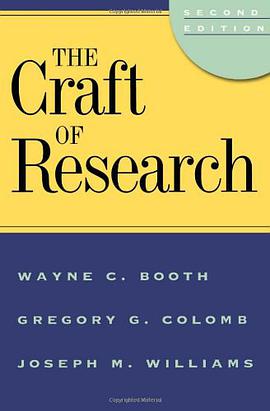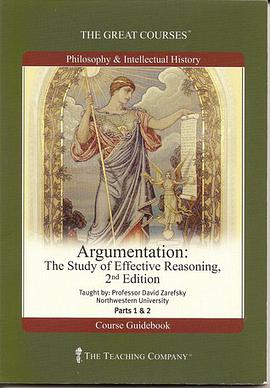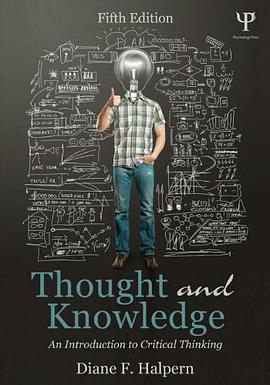思维
Good Reasoning Matters! 豆瓣
作者:
Leo A. Groarke
/
Christopher W. Tindale
Oxford University Press, USA
2008
- 4
Good Reasoning Matters uses an innovative approach to critical thinking by teaching students how to argue effectively rather than just point out the short comings of ineffective arguments.
The Craft of Research, 2nd edition 豆瓣
所属 作品: 研究是一门艺术
作者:
Wayne C. Booth
/
Joseph M. Williams
…
University Of Chicago Press
2003
- 3
This manual offers practical advice on the fundamentals of research to college and university students in all fields of study. The Craft of Research teaches much more than the mechanics of fact gathering: it explains how to approach a research project as an analytical process. The authors chart every stage of research, from finding a topic and generating research questions about it to marshalling evidence, constructing arguments, and writing everything up in a final report that is a model of authority. Their advice is designed for use by both beginners and seasoned practitioners, and for projects from class papers to dissertations.
This book is organized into four parts. Part One is a spirited introduction to the distinctive nature, values, and protocols of research. Part Two demystifies the art of discovering a topic. It outlines a wide range of sources, among them personal interests and passions. Parts Three and Four cover the essentials of argument—how to make a claim and support it—and ways to outline, draft, revise, rewrite, and polish the final report. Part Three is a short course in the logic, structure, uses, and common pitfalls of argumentation. The writing chapters in Part Four show how to present verbal and visual information effectively and how to shape sentences and paragraphs that communicate with power and precision.
"A well-constructed, articulate reminder of how important fundamental questions of style and approach, such as clarity and precision, are to all research."—Times Literary Supplement
This book is organized into four parts. Part One is a spirited introduction to the distinctive nature, values, and protocols of research. Part Two demystifies the art of discovering a topic. It outlines a wide range of sources, among them personal interests and passions. Parts Three and Four cover the essentials of argument—how to make a claim and support it—and ways to outline, draft, revise, rewrite, and polish the final report. Part Three is a short course in the logic, structure, uses, and common pitfalls of argumentation. The writing chapters in Part Four show how to present verbal and visual information effectively and how to shape sentences and paragraphs that communicate with power and precision.
"A well-constructed, articulate reminder of how important fundamental questions of style and approach, such as clarity and precision, are to all research."—Times Literary Supplement
Argumentation: The Study of Effective Reasoning 豆瓣
作者:
David Zarefsky
The Teaching Company
2001
What is effective argument?
* It is Abraham Lincoln at Cooper Union in 1860, marshalling many lines of evidence to make the case that Congress has the power to regulate slavery.
* It is Franklin D. Roosevelt in a 1940 "fireside chat," employing a vivid analogy to convince Americans to lend war equipment to Great Britain, then battling Nazi Germany alone.
* It is the U.S. Supreme Court in 1954, using complex reasoning to decide unanimously that segregated schools are unconstitutional in Brown v. Board of Education.
* It is any individual or organization, drawing on the theory of argumentation to reason through a position and make the best possible case for it.
Argumentation: The Study of Effective Reasoning, 2nd Edition, is a rigorous introduction to the formal study of argumentation—communication that seeks to persuade others through reasoned judgment.
In 24 lectures you learn the building blocks of an argument, the different categories of argument and the issues that are at stake in each, the kinds of evidence that serve as proof in an argument, and many other aspects of argumentation and reasoning, illustrated with examples from some of the most famous speeches, debates, and controversies in American history.
* It is Abraham Lincoln at Cooper Union in 1860, marshalling many lines of evidence to make the case that Congress has the power to regulate slavery.
* It is Franklin D. Roosevelt in a 1940 "fireside chat," employing a vivid analogy to convince Americans to lend war equipment to Great Britain, then battling Nazi Germany alone.
* It is the U.S. Supreme Court in 1954, using complex reasoning to decide unanimously that segregated schools are unconstitutional in Brown v. Board of Education.
* It is any individual or organization, drawing on the theory of argumentation to reason through a position and make the best possible case for it.
Argumentation: The Study of Effective Reasoning, 2nd Edition, is a rigorous introduction to the formal study of argumentation—communication that seeks to persuade others through reasoned judgment.
In 24 lectures you learn the building blocks of an argument, the different categories of argument and the issues that are at stake in each, the kinds of evidence that serve as proof in an argument, and many other aspects of argumentation and reasoning, illustrated with examples from some of the most famous speeches, debates, and controversies in American history.
Thought and Knowledge 豆瓣
作者:
Diane F. Halpern
Psychology Press
2013
- 11




